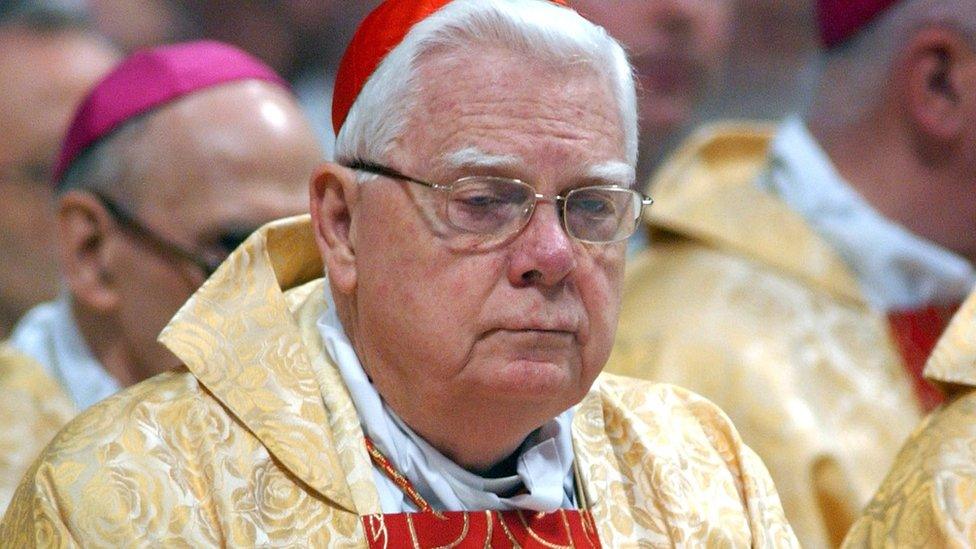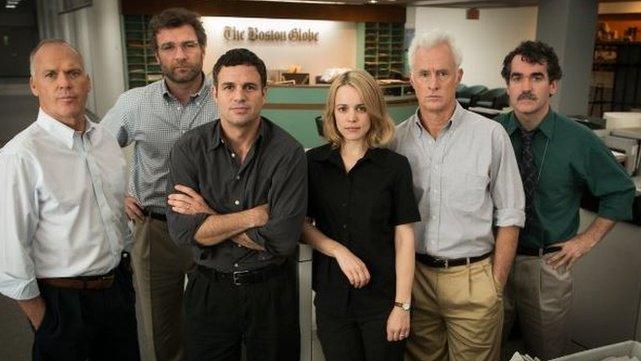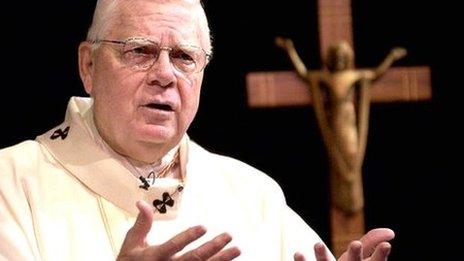Cardinal Bernard Law: Disgraced US cardinal dies in Rome
- Published

Cardinal Law was head of a major basilica in Rome until 2011
Cardinal Bernard Law, who was forced to resign as archbishop of Boston 15 years ago over a Church sex abuse scandal, has died aged 86 in Rome.
Cardinal Law stepped down in 2002 after journalists reported he had moved paedophile priests between parishes rather than addressing victims' claims.
The film Spotlight was later made about the allegations against dozens of priests in his Boston diocese.
After leaving Boston, Cardinal Law took a post at the Vatican.
He worked there until 2011.
The child sex abuse allegations, which covered events over a period of decades, led to hundreds of lawsuits and threatened the Boston diocese with bankruptcy.
As a result, it agreed to sell land and buildings for more than $100m (£63m) to fund legal settlements for more than 500 victims.
The scandal prompted the Vatican to draw up new plans to combat child sex abuse in the Roman Catholic Church.
Who was Cardinal Law?
Born in 1931 in Torreon, Mexico, Cardinal Law was the son of a US Air Force colonel and a musician. He graduated from Harvard University and was ordained a priest in 1961.
He soon became heavily involved in civil rights work in Mississippi and his name was included on a hit list compiled by segregationists.
In 1984, Cardinal Law was appointed Archbishop of Boston and was a high-profile figure both in Church matters and in the wider world.
He raised millions of dollars to help victims of natural disasters and worked to improve ties between Catholics and other Christian groups.
Cardinal Law held deeply traditional positions on issues such as Aids, abortion, same-sex marriage and education policy.
He stepped down as Archbishop of Boston in 2002 following a series of reports alleging the cover-up of sexual misconduct by priests exposed by the Boston Globe newspaper's investigative Spotlight team.
"It is my fervent prayer that this action may help the archdiocese of Boston to experience the healing, reconciliation and unity which are so desperately needed," he said at the time.
Cardinal Law went on to serve as the archpriest of the Basilica of the Santa Maria Maggiore until his retirement at the age of 80 in 2011.

A career eclipsed by scandal

By Martin Bashir, BBC religious affairs correspondent
Although Cardinal Bernard Law played a major role in inter-religious dialogue, serving as chair of the Bishops' Committee on Ecumenical and Interracial Affairs and on the Vatican's Commission on Religious Relations with Jews, it was his action in covering up child sexual abuse that stained his entire career.
Revelations in the Boston Globe newspaper led to the uncovering of widespread child abuse by Catholic clergy within his diocese. The newspaper was awarded the Pulitzer Prize and Cardinal Law was forced to resign as Archbishop of Boston in 2002.
Cardinal Law never faced criminal charges for his role in allowing priests accused of abusing children to remain in the church and his appointment as archpriest of the Papal Liberian Basilica of St Mary Major, effectively a second career, was perceived as adding insult to the injuries inflicted on children.

Key dates:
1931: Born in Torreon, Mexico
1961: Ordained a priest
1973: Appointed bishop
1984: Became Archbishop of Boston
1985: Appointed cardinal
2002: Vatican accepts his resignation
What did Spotlight do?
The investigation carried out by the Boston Globe's Spotlight team led to reports that dozens of priests who sexually abused children had been moved from parish to parish for years under Cardinal Law's tenure without informing parishioners or police.
At the time, the Church was politically powerful in Boston and the cover-up of sexual abuse by more than 70 priests in the Boston area was seen as a move aimed at protecting the institution's reputation.
However the damning reports published by the Globe resulted not only in the resignation of Cardinal Law, but the uncovering of further abuse in 102 cities in the US and 105 dioceses worldwide.
The story of the Spotlight investigation, which involved a team of four reporters, was immortalised in the 2015 film Spotlight, which won the Oscar for Best Picture in 2016.
- Published25 January 2016

- Published21 November 2011
